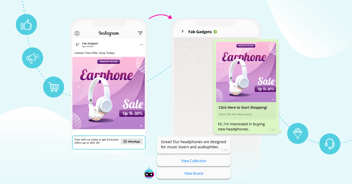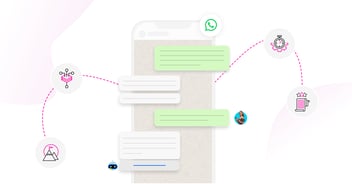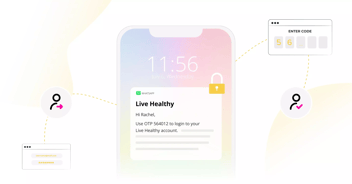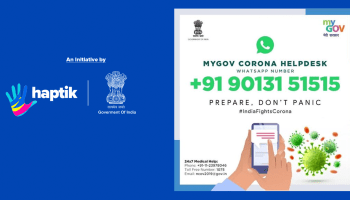WhatsApp Marketing Software Compliance: Regulations & Best Practices

WhatsApp has emerged as an essential communication channel for businesses to engage with customers on a personal level and build enduring relationships. To ensure that businesses use WhatsApp Marketing Software responsibly and competently, the platform has established policies and guidelines that companies must adhere to. Maintaining WhatsApp compliance helps to foster customer trust and credibility, encouraging repeat business by demonstrating a commitment to privacy and security. It also mitigates legal and reputational risks associated with non-compliance. Thus, adhering to these guidelines is crucial for businesses to leverage WhatsApp as a powerful communication tool, build brand trust and establish long-term customer relationships.
Compliance with the WhatsApp Business & Commerce Policy is mandatory for brands using the platform. Failure to comply can result in negative consequences, including temporary or permanent bans, reduced reach, warnings, and temporary messaging blocks. The comprehensive policy covers all aspects of WhatsApp to ensure customer safety and prevent spam. Enforcement actions and alerts provide businesses with a grace period to correct any violations. Companies are committed to delivering secure and meaningful customer interactions by adhering to the policy.
In this blog, the following topics will be covered.
I. WhatsApp Marketing Software Regulations
II. Benefits of Compliance with WhatsApp Marketing Software
III. Challenges in Compliance with WhatsApp Marketing Software
IV. Best Practices for WhatsApp Marketing Software Compliance
I. WhatsApp Marketing Software Regulations
Businesses using WhatsApp marketing software must comply with the General Data Protection Regulation (GDPR) and California Consumer Privacy Act (CCPA) regulations to protect customers' privacy and avoid legal consequences. These regulations require businesses to
- Obtain proper consent
- Maintain accurate records, and
- Provide customers with opt-out options
Failure to comply can lead to financial penalties and damage to the brand reputation. Businesses must ensure that their software provider also complies with these regulations and has implemented necessary data protection measures. Compliance builds customer trust and protects companies from legal consequences.
An Overview of WhatsApp Business API Terms of Service
Understanding and complying with the platform's terms of service is vital for businesses using the WhatsApp Business API. The terms of service provide guidelines for the proper use of the API, including message templates and content restrictions.
Companies must ensure their messaging practices align with the guidelines to avoid spamming customers or sending irrelevant content. WhatsApp also restricts the type of content that can be transmitted through the API, including prohibitions on gambling and adult content.
Non-compliance with the Terms of Service can result in temporary or permanent bans from the platform, making adherence crucial for businesses to maintain a positive customer experience.
II. Benefits of Compliance with WhatsApp Marketing Software
From building trust with customers to enhancing brand reputation and improving the experience of the overall customer journey, compliance is essential for businesses to succeed in today's digital landscape.
- Higher Customer Engagement
It helps build customer trust by ensuring that businesses respect their privacy and preferences. This, in turn, leads to higher engagement and loyalty among customers.
- Staying Safe from Penalties and Legal Issues
Compliance with WhatsApp marketing software guidelines can help businesses avoid penalties and legal issues that may arise from non-compliance. This is especially important in the context of data protection and privacy regulations, where companies that fail to comply may face hefty fines and legal action.
- Gaining a Competitive Advantage
Compliance also offers the advantage of improving brand reputation by promoting transparency and honesty in messaging. This can help businesses establish themselves as ethical and trustworthy, thus gaining a competitive advantage.
- Enhanced Customer Experience
Finally, compliance with WhatsApp marketing software guidelines can enhance customer experience by ensuring that messaging is relevant, personalized, and timely. By respecting customer preferences and providing value through messaging, businesses can foster long-term relationships and improve customer satisfaction score.
III. Challenges in Compliance with WhatsApp Marketing Software
Compliance with WhatsApp marketing software poses several challenges for businesses. Failure to comply with the guidelines of using WhatsApp Marketing tools for marketing purposes can result in legal repercussions, loss of brand reputation, and loss of customer trust.
- Handling Data Privacy Concerns
One of the significant challenges in compliance with WhatsApp marketing software is handling data privacy concerns. WhatsApp is a platform that allows businesses to communicate with customers, and this communication may involve sharing personal information.
Companies must ensure that they comply with data protection laws and regulations to protect their customers' privacy. This requires implementing robust data privacy policies, securing data storage, and providing transparency about customer data use.
- Ensuring Consistent Compliance across Multiple Teams
Businesses often have multiple teams involved in marketing activities, and each team may have its own interpretation of the guidelines and regulations. This can lead to inconsistencies in compliance practices, which may ultimately result in legal and reputational damage.
To address this challenge, businesses must establish clear compliance policies, provide regular training to their teams, and regularly monitor compliance practices.
- Keeping up with Changing Regulations
Finally, keeping up with changing regulations is another significant challenge in compliance with WhatsApp marketing software. Laws and regulations governing data protection and privacy are constantly evolving, and businesses must keep abreast of these changes to ensure that their compliance practices remain up-to-date.
IV. Best Practices for WhatsApp Marketing Software Compliance
Businesses must adhere to WhatsApp guidelines to prevent spamming customers and damaging their brand reputation. Following these guidelines helps businesses utilize WhatsApp Marketing Software effectively while ensuring compliance and optimal user experience.
Consent and Permission
One of the critical aspects of WhatsApp marketing software compliance is obtaining consent and permission from customers before messaging them. To streamline the opt-in process, businesses should provide clear and concise instructions to users, including the type of messages they will receive and how often.
Opt-out Mechanisms
The opt-out mechanisms allow customers to revoke their consent and unsubscribe from messaging. It is also crucial to respect the users' right to opt out and promptly fulfill their requests to maintain customer satisfaction.
Data Protection and Security
Data protection and security are also essential elements of WhatsApp marketing software compliance. Businesses should take measures to ensure that customer data is secure and protected from unauthorized access or use. Transparency and honesty in messaging are also crucial for maintaining customer trust and brand reputation.
Data Retention and Deletion
Businesses must comply with data retention and deletion policies. This involves retaining customer data only for as long as necessary and deleting it once it is no longer needed. Compliance with these policies can help enterprises avoid data breaches and reputational damage.
Conclusion
In conclusion, ensuring compliance with WhatsApp marketing software is critical to any business's marketing strategy. With the increasing use of WhatsApp as a communication channel, companies must take steps to capitulate with regulations and implement best practices to avoid legal and reputational risks.
To achieve this, businesses should establish clear policies, train their teams regularly, and keep up-to-date with changing regulations. By doing so, companies can maintain customer trust, protect customer data, and build a strong reputation while reaping the benefits of WhatsApp as a powerful marketing tool. Ultimately, prioritizing compliance with WhatsApp marketing software regulations and best practices can help businesses achieve their marketing objectives while maintaining ethical and legal standards.
Join the Future of Commerce with Haptik's WhatsApp Solutions





















.png?width=352&name=Header%20(5).png)







.png?quality=low&width=352&name=CORONA_Helpdesk_Blog%20(1).png)
.png?width=352&name=image-(1).png)



.webp?width=352&name=new-whatsapp-ecom%20(1).webp)







